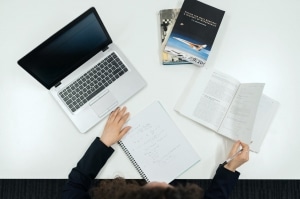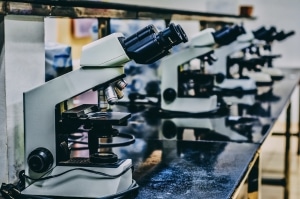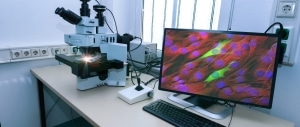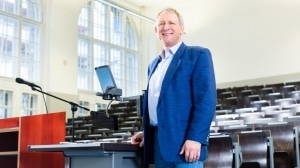It will typically take you at least three years to complete your PhD, which equates to 156 weeks! In this time you’ll have many ups, some downs and hopefully some fun too! Within the first few months, you’ll be getting your teeth into your project and your days will be filled with paper reading sessions, experiments, meetings with colleagues and collaborators and many more things. But how should you spend your first week as a PhD student? Here’s my guide to help you get started on your journey:
1. Make Your Workspace Your Own
Whilst your work environment will depend on your chosen university and research group, you will need to set up a comfortable workspace for yourself. This might be at a dedicated desk space alongside other students in the group or an office space at home. Either way, make sure you spend some time making your space a place where you want to work; find a comfortable chair that’s ergonomic and will be gentle on your back after hours of writing. A lamp with a soft light for focused work is a great tool as is a calendar for planning your days, weeks and months.
2. Get All the Forms Sorted
Before starting your PhD and in the early stages, you’re likely to receive many pieces of paperwork that need to be processed. These may range from ensuring the university has your correct bank details for making stipend payments, to getting your email address and university logins established. These have to be done so try to prioritise this paperwork in your first week.
3. Make Sure Your Access Cards Work
After registering with the university, you’ll receive your student ID card. Make sure that this card allows you access to all the buildings across the university that you will need to use, including the library and any labs you’ll be working in. Additionally, find out what the department’s rules are for building access out of normal office hours and ensure your card will work at these times. You’ll likely have some downtime during your first week as a PhD student, try to use this time to explore as much of your new working environment as possible.
4. Get to Know the Admin Staff
You’ll get to know your supervisor(s) very well over the course of your PhD but also make friends with the admin staff in your department. They’ll often be able to help you navigate the complex paperwork questions that will come your way and also how best to make use of the resources available to you as a student.
5. Start Reading Papers
You may still be waiting to have your first proper meeting with your supervisor(s), where you’ll discuss and craft the direction of your research project so you need to approach this meeting with some background knowledge fresh in your mind. A simple search on ResearchGate, Google Scholar or PubMed can help you find some relevant papers to read. It’s also a good idea to be familiar with your supervisor’s recent publications.
6. Meet Your Supervisor(s)
During your first week as a PhD student, it would be ideal to set up a meeting with your supervisor(s). Some supervisors prefer planned meetings scheduled in the diary regularly whilst others will leave it to you to reach out to them as and when needed. Early within your PhD you are unlikely to know their preference, which is even more of a reason to meet them during your first week so you can establish a clear means and frequency of communication.
7. Get to Know Others in Your Research Group
A PhD is a large body of independent work, but that doesn’t mean that you should spend three years in isolation! You’ll likely be surrounded by other students at various stages in their PhD journeys and it can be a substantial help to have colleagues to bounce ideas off of, or just to vent to! You’ll all be going through similar experiences – remind each other to enjoy life outside of research too!
Once you are ready to start your work, check out my tips for new PhD students to make sure you continue to use your time effectively and set yourself up for a successful programme.











